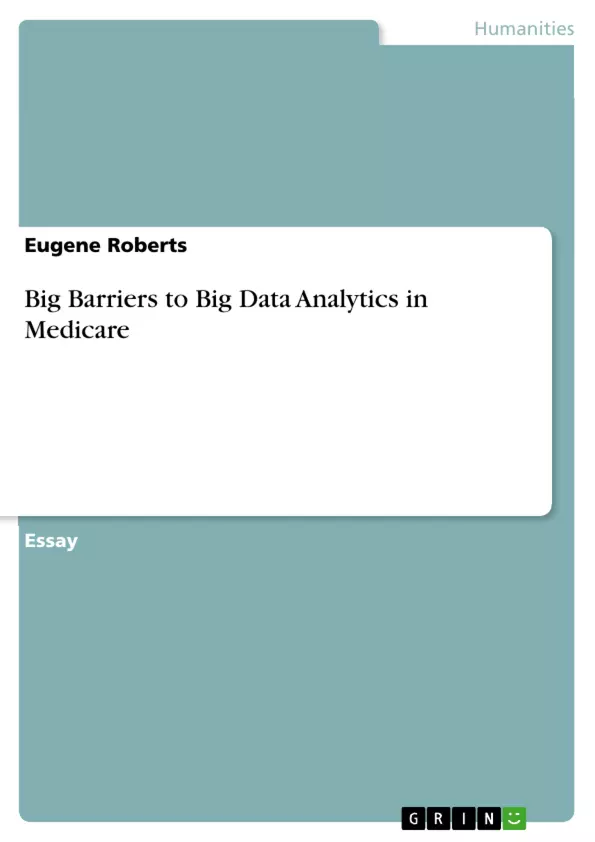The Center for Medicare and Medicaid Services (CMS) manages health care for over one hundred million patients. A large majority of these are Medicare members, for which the CMS is responsible for administering health care benefits through medical claims data. For this population, comfortability with their health care physician, quality of life, cost, and longevity are all of concern. Indeed, Medicare members’ financial and health concerns burden not only the members themselves, but families and taxpayers as well.
The recent emergence of big data analytics (BDA) has provided solutions to issues like these in many other patient populations. The CMS has recently conducted some internal BDA and has shown efficacy in fighting fraud and lowering hospital readmissions. However, the agency cannot possibly conduct research to addresses all Medicare members’ needs in such an encapsulated manner.
Other government agencies that house similar data provide easy access, and even some analytical discovery tools, to outside researchers in varying settings. The CMS has partners to help manage data and its availability to researchers, however, large barriers to BDA in Medicare still exist. In addition to conventional challenges with big data characteristics, the CMS faces regulatory and legal hurdles in health care policy and data privacy.
Additionally, extremely rigorous application processes and prohibitively high costs limit researchers’ access to Medicare data for discovery and early-stage research purposes. These barriers need to be overcome to expand the CMS’s success in other areas to addressing all the health needs of Medicare members.
Inhaltsverzeichnis (Table of Contents)
- Abstract
- Introduction
- Medicare
- Big Data Analytics
- Statement of the Problem
- Methods
- BDA Research Workflow
- Data acquisition
- Storage
- Research data subsets
- Data manipulation
- Reporting and Visualization
- Virtual research data center
- Results
- Discussion
- References
Zielsetzung und Themenschwerpunkte (Objectives and Key Themes)
This research examines the significant barriers preventing the implementation of Big Data Analytics (BDA) within Medicare, specifically focusing on the challenges posed by the Center for Medicare and Medicaid Services (CMS).
- Analyzing the characteristics of Medicare data, emphasizing its vast volume, velocity, variety, veracity, and value.
- Exploring the regulatory and legal hurdles, including data privacy concerns, associated with utilizing Medicare data for research purposes.
- Highlighting the limitations imposed by stringent application procedures and high costs, which restrict researchers' access to Medicare data.
- Assessing the potential benefits of BDA in Medicare, including improved quality of healthcare services and cost reduction.
- Identifying the need to overcome these barriers to unlock the full potential of BDA in addressing the healthcare needs of Medicare members.
Zusammenfassung der Kapitel (Chapter Summaries)
The Introduction section provides an overview of Medicare and its role as the largest payer in US healthcare, outlining the challenges and opportunities associated with administering health care benefits for over 55 million Medicare beneficiaries. This section also introduces Big Data Analytics (BDA) and its potential applications in addressing issues like fraud, quality of care, and cost reduction within Medicare. The Statement of the Problem chapter focuses on the limitations currently preventing the full utilization of BDA in Medicare, highlighting the need for addressing these barriers to optimize BDA's potential.
Schlüsselwörter (Keywords)
The key focus of this research revolves around the intersection of "big data," "analytics," and "Medicare," specifically investigating the challenges and opportunities presented by the Center for Medicare and Medicaid Services (CMS) in leveraging BDA to improve healthcare for its beneficiaries. Other important concepts include "informatics," "bioinformatics," and the associated challenges related to data privacy and regulatory compliance.
Frequently Asked Questions
What is Big Data Analytics (BDA) in Medicare?
It involves using large-scale data processing to identify health trends, fight fraud, and improve the quality of care for over 100 million patients.
What are the main barriers to using BDA in Medicare?
Major hurdles include strict data privacy regulations, high access costs for researchers, and complex legal requirements.
How can BDA help prevent fraud in healthcare?
By analyzing millions of claims in real-time, BDA can flag suspicious patterns and prevent billions of dollars in fraudulent payments.
What is the role of the CMS in data management?
The Center for Medicare and Medicaid Services (CMS) oversees the data but faces challenges in making it accessible to external researchers.
Why is health data privacy such a big concern?
Medicare data contains highly sensitive personal information, and any breach could have severe legal and personal consequences for beneficiaries.
- Quote paper
- Eugene Roberts (Author), 2017, Big Barriers to Big Data Analytics in Medicare, Munich, GRIN Verlag, https://www.grin.com/document/352261



